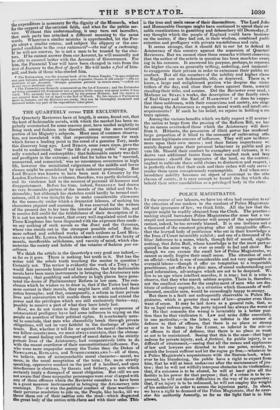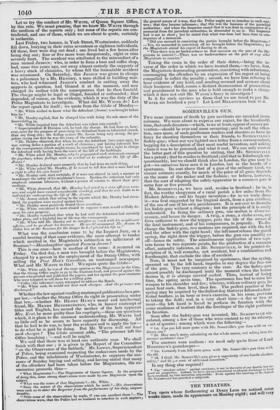POLICE MAGISTRATES.
IN the course of our labours, we have too often had occasion to cal the attention of our readers to the conduct of Police Magistrate Of their ignorance of law, we think little. All the law that the require might be readily obtained from the Clerk. The practice o making stupid banisters Police Magistrates (for none but a ver. stupid and unsuccessful barrister will accept of the appointment. cannot, indeed, be too severely blamed. It is one instance out cr a thousand of the constant grasping after all imaginable offices. that the learned body of gentlemen who eat in their knowledge a the Inns cf Court invariably exhibit ; and one of a thousand of tin blind deference to a name, which, though full of sound, signifie:- nothing, that John Bull, whose knowledge is for the most part ac- quired in the same way, is ever so ready to feel and show. But though we can excuse the small law of Police Magistrates, wt cannot so easily forgive their small sense. The situation of such an official—which is one of considerable and not very agreeable as overpaid labour—though it offer no temptation to a respectable practitioner, yet offers to a plain man, of sound understanding and good information, advantages which are not to be despised. We live in an age when intellect marches, it is true; but it is trite to observe, that they who march seldom acquire. There is, therefore, not the smallest excuse for the employment of men who are des- titute of ordinary sagacity, in a situation which thousands of well- educated, sensible men, would be exceedingly happy to occupy. . But there is a fault not unfrequently observable in Police Ma- gistrates, which is greater than want of law—greater even than want of sense. It may be laid down as a general rule, that, as far as legal redress goes, the party injured has always the worst of it. He that commits the wrong is invariably in a better posi- tion than he that vindicates it. Law and arms differ essentially in one particular,—in the latter, so inferior is the science of defence to that of offence, that there is no place so strong as not to be taken ; in the farmer, so inferior is the science of offence to that of defence, that there is• no place so weak as not to be maintained. Seeing that this is the case—that legal redress for private injury, and, a fortiori, for public injury, is so difficult of attainment,—seeing that all the means and appliances of law and lawyers are directed to but one point, namely, to punish the honest sufferer and let the rogue go free,—whatever be a Police Magistrate's acquaintance with the Statute-book, what- ever be his blundering, the public have a right to expect from him, that be will at least endeavour after the maintenance of jus- tice ; that he will not wilfully interpose obstacles to its vindication; that, if a nuisance is to be abated, he will at least give all the facility in his power for that purpose ; that, if a crime is to be re- pressed, he will not throw difficulties in the way of its repression ; that, if an injury is to be redressed, he will not employ the weight of his authority in order to screen the injurious party. In shorts we have a right to demand of the Police Magistrate, that he exer- cise his authority honestly, as far as the light that is in him Let us try the conduct of Mr. WHITE, of Queen Square Office, by this rule: We must premise; that we know Mr.WHII'E through the medium of the reports only ; but none of the reports are con- tradicted, and one of those, which we are about to quote, certainly 1.8 authentic.
• Last Friday, two houses, in York Street, Westminster, suddenly fell down, burying in their ruins seventeen or eighteen individuals.. Of these, four were dug out dead ; one lived but a few hours after being dug out; four or five more were dangerously, eight or nine severely hurt. The accident was attributed to the misconduct of a . roan named JESSON; who, in order to form a beer and coffee shop, had, some two years ago, cut away almost entirely the supports of a heavy stack of chimnies, by whose fall the lamentable accident was occasioned. On Saturday, this JESSON was given in charge to a policeman by a Mr. HENDRY, a man skilled in building mat- ters, who had witnessed JESSON'S conduct in cutting away the supports in question, had blamed it at the moment, and now charged its author with the consequences that he then foretold. The charge might be legal or illegal, founded or unfounded ; that depended, of course, on the evidence, which it was the duty of the Police Magistrate to investigate. What did Mr. WHITE do ? Let the report speak for itself; we quote from the Globe of Monday- " Mr. White wished to know what the defendant [Jesson] was brought before him for?
"Mr. Hendry replied, that he charged him with being the sole cause of the houses faibug in. "Mr. White inquired how the defendant was taken into custody?
"Superintendent B Division said, lie took the charge. He had done so, how- ever, more for the purpose of protecting the defendant from an infuriated crowd, than any thing else; the feeling against Mr. Jesson being very strong, the po- pulace crying out that he was the cause of the calamity..
"Mr. Hendry observed, that when he saw the defendant [two years ago], he was cutting down a portion of a stack of ehininies ; and having informed him of the consequences which might ensue, lie considered he had a right to charge the defendant with having been the cause of the fall of the buildings. "Mr. White asked Mr. Hendry, why he propagated such statements amongst the populace, whose feelings were so excited as to endanger the life of Mr. Jesson?
"Mr. Hendry declared most earnestly that he had done no such thing.
"Mr. White asked Mr. Hendry, if lee meant to tell hint that a man- had not aright to alter his own house?
"Mr. Hendry said, most certainly, if it were not altered in such a Manner as to endanger the safety of his neighbour's house. Besides, the defendant had only employed common labourers, without a person of science to direct their pro- ceedings. "Mi. White observed, that .111r. _Hendry lead acted in a very officious man- ner, and might leave caused considerable mischief, and that he was liable to be indicted for endangering the lip! of Mr. .Jesson. "Mr. Jesson stated, that owing to the reports which Mr. Hendry had circu- lated, the populace were excited against him. "Mt. Hendry most positively denied those assertions. "Mr. White considered it most absurd to suppose a man would wilfully de- stroy his own property. "Mr. Hendry remarked, that what he had told the defendant had certainly taken place, and a frightful loss of life was the consequence. "Mr. White told Mr. Hendry not to 'interfere so much with his neighbours' affitirs, and to yo about his business. Ile wonld recommend Mr. Jesson to indict him at the Sessions for the danger he ha:l. placed his life in."
What was the conclusion come to by the Inquest Jury, on a careful hearing of that same evidence, the mere attempt to tender which merited in the Magistrate's estimation an indictment at Sessions ?—Manslaughter against Francis Jesson! This is one case—here is another of the same : it occurred on Friday. On that day, a man was brought before the Magistrates, charged by a person in 'the employment of the Stamp Office, with selling the Poor' Man's Guardian, an unstamped newspaper. What said Mr. WHITE to this? . We again quote the Globe— "Mr. White said, he was of the same opinion as the Magistrates in the City, that the Stamp Office ought to go to the fountain-Lead, and proceed against the persons who printed and published the papers, and not against the poor creatures who were tempted to sell them for a trifling gain.
"Colley [the informer] again attempted to address the Bench. "Mr. White said, he would not hear such charges. And the prisoner was discharged."
Whether the law against vending unstamped publications be a pro- per law,—whether the Stamp Office do right in prosecuting under that law,—whether Mr. HENRY HUNT'S moral and intellectual friend, Mr. HENRY HETHERINGTON, who, in honest contempt of titles and English, has named the mother of the heir apparent Mrs. Kent, be more guilty than his employes,—these are questions which, it is plain to the meanest understanding, Mr. 'WHITE had as little call as he .seems to have capacity for discussing. All that he had to do was, to hear the evidence and to apply the law— to do what he is paid for doing. But Mr. WHITE will not hear such charges ! The Globe account. adds, "The prisoner left the
Office laughing ; "—and well he might. . We said that there was at least one authentic case. We shall
finish with that one ; it is given in the Report of the Committee "on the Observance of the Sabbath." ,Mr.Loway, Superintendent of Police, being examined respecting the endeavours made by the Police, and the inhabitants of Westminster, to suppress the nui- sance of Sunday buying and selling, and havino. stated that many of the offenders had been taken before the Magistrates, the ex- amination proceeds thus-
" What Magistrates ?—The Magistrates of Queen Square. In the progress of doing this, some strong observations were made by,one Magistrate upon the subject. "What was the name of that Magistrate ?—Mr. White.
"State the nature of the observations which he made ?—His observations were such as to deter the Inspeetor from the performance of his duty, unques- tionably.
"State some of the observations he made, if you can recollect them ?—The observations were, that the Police had no business to interfere in such matters;
the general nature of it was, that the Police ought not to interfere in such mat- tent that they became informers; that this was the business of the parochial authorities : and when the Inspector stated that it was done in consequence of a memorial from the parochial authorities, he demanded to see it. The Inspector had it not to show; but he stated that what was done had been done in con. seqUence Of a memorial.
"Did you succeed in convicting the parties brought before the Magistrates? —Yes we succeeded in convicting all we brought before the Magistrates; but the Magistrate stated his regret at having to do so. "Then there was no backwardness on that occasion on the part of the Ma- gistrate to convict ?—There was no backwardness on the part of any °ilea. Magistrate to convict."
Taking the cases in the order of their dates,—being the in- verse of the order in which we have treated them,—we have, first, the Magistrate deprecating prosecution, convicting with reluctance, encouraging the offenders by an expression of. his regret at being compelled to inflict the penalty ; second, we have him refusing to hear evidence of any kind, and sending accused and accuser about their business; third, comes a distinct denunciation of prosecution and punishment to the man who is bold enough to make a charge which it does not suit Mr. WHITE'S fancy to investigate ! Is it for such services as these that we are taxed to pay Mr. Wm= six hundred a year ? Let Lord MELBOURNE look to it.




















































 Previous page
Previous page